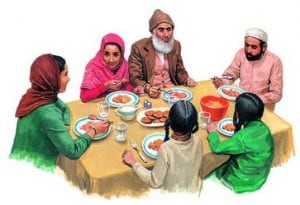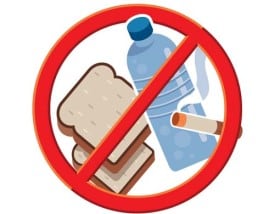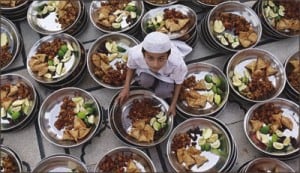Ramadan is the most auspicious and blessed month of the entire Islamic calendar. Among all Muslims, the month of Ramadan is celebrated with great enthusiasm and devotion and Muslims start preparing for the Ramadan spirit soon after Shab-e-Barat. During this month, Muslims pray a lot and fast regularly for an entire month till the celebration of Eid.
Essential Facts about the Month of Ramadan

Ramadan is a very blessed month and during this month, Allah promises to listen to all legitimate prayers of Muslims. Fasting during this month is a way to protect you from evil and learn patience, humility and control. It is also considered to be a shield against evil and allows Muslims to get rid of their sins. The Prophet (PBUH) said,
“Whoever fasts during the month of Ramadan out of sincere faith and hoping for a reward from Allah will have all of his previous sins forgiven.”
One important benefit of fasting is that it helps you to understand the suffering and pain of the poor. It also allows human beings to understand how those who do not have enough money for a meal survive through the day. Therefore, it is believed that fasting makes individuals a better human being as it allows them to associate with the pain of others.
Fasting also allows individuals to learn self-restraint, self-control and sacrifice for the love of a higher deity. It eventually teaches Muslims to connect with their inner self through rigorous praying and worshipping.
Do’s and Don’ts of Ramadan
While fasting during Ramadan, all Muslims should try to follow the things given below.

1. Abstaining from all forbidden things
2. Praying increasingly
3. Reciting Quran and following the Quran teaching
4. Offering Taraweeh prayers
5. Helping poor in monetary terms to break their fast
6. Being patient and observe self-control
While fasting during Ramadan, Muslims should abstain from the following activities:

1. Eating food and drinking water or any other kind of fluid
2. Getting angry or losing temper
3. Being impolite, rude or inconsiderate
4. Using obscene language or bad words
5. Gossiping and backbiting
6. Lying or cheating
7. Arguing, fighting or yelling
8. Indulging in sexual activities
When Ramadan Fasts can be skipped

Islam is not a strict religion as it understands the problems that humans may face. Therefore, Allah allows individuals to skip their Ramadan fasts if they fulfill some conditions. Individuals who can skip the fast include the following:
1. Those who have to travel beyond the city and they do not have the strength to travel without food and water for the entire day.
2. Those who are sick, suffering from a very painful disease or those who need to take medicines regularly.
3. Elderly individuals who are too weak to stay hungry and thirsty for the entire day.
4. Women who are going through their menstruation cycle or those who are going through their postnatal bleeding stage.
5. Women who are expecting as they might need to take medicines regularly otherwise it may affect their or the baby’s health.
6. Those who are mentally ill.
Women who are going through their menstruation cycle, postnatal bleeding or individuals who are sick may also complete their fast after the month of Ramadan is completed.
Ramadan Guidelines to Stay Healthy
During this month, people face a lot of health related problems because of the sudden change in their routine. Individuals suffer from problems such as headache, low blood pressure, constipation, gastritis etc. therefore, it is always wise to keep a strict check on your diet during this month. Some guidelines are mentioned below.

1. Consume slow digesting foods such as oat, wheat, barley, lentil etc.
2. Eat fibrous food such as green vegetables, beetroot, fruit with skin etc.
3. Avoid fried and high cholesterol food such as sweets, potatoes, junk food etc.
4. Avoid overeating. At iftar, eat like you eat during the normal days for one meal.
5. Consume almonds, bananas, dates, haleem etc.
6. Increase water intake to stay hydrated during the day.
7. Avoid tea and coffee.
Conclusion

Ramadan is a blessed month for all Muslims. During this month, Muslims should focus on praying, worshipping, abstaining from forbidden things rather than on eating good food and buying expensive clothes for Eid. Live Quran based life and encourage others to do the same.

No comments:
Post a Comment